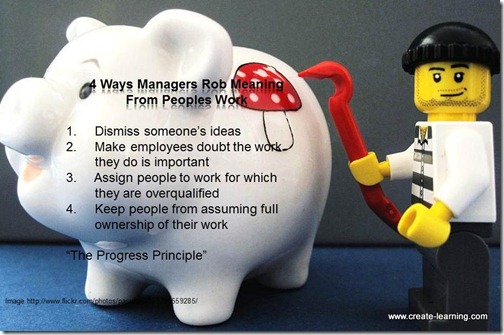Any manager has the ability to make work a joy or miserable. If your manager is great perhaps you are on a project team and that project manager has the ability to make you feel great and want to do more or make you want to stop everything and do as little as possible.
The ability to add meaning to our own work and as a manager add value to the work of others happens in the small daily interactions you have.
It is not the grand programs and engagement seminars. Or the picnics and play dates.
The ability for people to do great work, make progress and increase the innovation and skills that go into the work happen in the small daily interactions.
There are 4 areas that managers need to be careful of, because these culprits rob meaning form peoples work…and when work becomes meaningless the output is not that good.
- Dismiss Someone’s Idea. “That is a bad idea and will not work.” or “That is a really stupid idea.” or “Obviously you don’t know what you are talking about.” And more all are quick ways to kill any desire for progress and new ideas.
- Make employees doubt the work they do is important. “It is nice that you decided to do that, but it is not really important to the project.” or “We all decided to place you on the low risk part because it is least important. or “I know I agreed in the meeting that your work is needed, but after that I decided that it is not necessary.” And a mixture of words that are used to make managers feel empowered and employees feel drained of any motivation.
- Assign people to work for which they are over qualified. I know there are times when people have to do work that they are overqualified…as a manager acknowledge this and explain why you are asking them to-do the work. BUT be sure that it is not because you are being a thoughtless jerk. Example…on a project team of skilled engineers and biologists the Project Manager handed a hand written note with his scribbles all over it to the PHD Toxicologist and said, “Can you type up these notes I have written.” She questioned him, “Can you put these in track changes, like we agreed in the meeting then I can look over and change what needs to be changed for this project.” His response, “No I am too busy and you can do this.”
- Keep people from assuming full ownership of their work. This happens when people have been making progress, then they are asked to just stop, or the priorities change and something that was owned by them has now disappeared. “Yes, you did work hard on that and now that project is no longer important someone else will finish the project.” or “As you are working on that project I need to see and know what you are doing that way the ownership is not solely on you.” People need to understand and feel progress on the work they do, to keep ownership of their work.
What do you think?
In what ways has the meaning been robbed from your work? How do you go about making sure people keep motivated and that their work has meaning? Any great examples?


